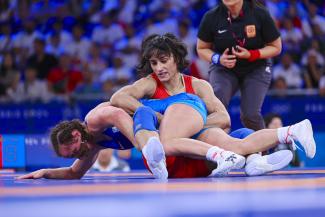Gadzhimagomedov, Karimi, Kurbanaliev Give Iran FS League Title to Bimeh
Monday, November 5, 2018 - 12:13 By Ali Feizasa

GORGAN CITY, Iran - Using Russian and Iranian stars, Bimeh Razi Babol captured the 2018 Iran Freestyle League title, earning a 26-15 victory over Setaregan Sari in the final match in Gorgan city.
Sari's team opened up the finals with back-to-back wins from Nader HAJAGHANIA (IRI) and Mehran SHEIKHI (IRI) 57kg and 61kg respectively. After a 5-3 Hajaghania win at 57kg, Sheikhi (Sari) defeated three-time Asian champion and runner-up Behnam EHSANPOUR (IRI) (Bimeh), 5-2 at 61kg.
Then, Asian champion (2016) Meysam NASIRI (IRI) downed Farzad AMOUZAD (IRI), 6-2, giving Bimeh their first team victory. Russia's 2016 world champion Magomed Kurbanaliev, who was one of the three Russian wrestlers on Bimeh, defeated YEGANEH JAFARI at 70kg by technical fall, 15-4, giving his squad their second victory in a row.
In the fifth match, it was Hossein ELYASI (IRI) who kept Sari's hopes alive, beating Reza AFZALI, 6-4, breaking the two to two tie and giving Sari the 3-2 lead.
Russia's 79kg Budapest world team member and 2018 world bronze medalist, Akhmed GADZHIMAGOMEDOV (RUS), demolished Fariborz BABAEI (IRI), 10-0, evening the bout up at three apiece.

Alireza KARIMI (IRI), who won 2018 world bronze medal at 92kg, stepped on the mat at 86kg and earned a victory by fall against Masoud MADADI (IRI) to give Bimeh their fourth victory and the outright lead for the first time of the dual.
Mohammad Javad EBRAHIMI (IRI) (Bimeh), the 2018 Asian champion, had an easy time against Sina GHOLAMI (IRI) (Sari) in the 92kg bout, defeated him 8-3. Then, 2018 European champion Vladislav BAITSAEV (RUS) secured the finals victory for Bimeh by winning over Iran's 2017 world team member, Amir MOHAMMADI, 6-0.
At heavyweight, former world junior champion Jaber SADEGHZADEH (IRI) (Sari) won the match against Abbas FOROUTAN (IRI) (Bimeh), 8-7, but it was useless for his side, and Bimeh Razi defeated Setaregan Sari 26-15 to capture 2018 Iran Freestyle League Title.
Meanwhile, the host team, Shahrsazi Golestan, beat Petroshimi Behshahr, 26-6 in the third-place bout.
Final Match: Bimeh Razi Babol df. Setaregan Sari, 26-15 (6-4)
57kg- Nader HAJAGHANIA (Sari) df. Mehran REZAZADEH (Bimeh), 5-3
61 kg- Mehran SHEIKHI (Sari) df. Behnam EHSANPOUR (Bimeh), 5-2
65 kg- Meysam NASIRI (Bimeh) df. Farzad AMOUZAD (Sari), 6-2
70 kg- Magomed KURBANALIEV (Bimeh) df. Mohammad Mehdi YEGANEH JAFARI (Sari) by TF, 15-4
74 kg- Hossein ELYASI (Sari) df. Reza AFZALI (Bimeh), 6-4
79 kg- Akhmed GADZHIMAGOMEDOV (Bimeh) df. Fariborz BABAEI (Sari) by TF, 10-0
86 kg- Alireza KARIMI (Bimeh) df. Masoud MADADI (Sari) by FALL
92 kg- Mohammad Javad EBRAHIMI (Bimeh) df. Sina GHOLAMI (Sari), 8-3
97 kg- Vladislav BAITSAEV(Bimeh) df. Amir MOHAMMADI (Sari), 6-0
125 kg- Jaber SADEGHZADEH (Sari) df. Abbas FOROUTAN (Bimeh), 8-7
Third Place Match: Shahrsazi Golestan df. Petroshimi Behshahr, 26-6
57kg- Alireza HATAMI (Petroshimi) df. Pourya TORKAMAN (Golestan), 6-0
61 kg- Mohammad RAMEZANPOUR (Petroshimi) df. Kheirollah GHAHREMANI (Golestan), 6-3
65 kg- Shayan HAMZEH (Petroshimi) df. Milad TAHMASEBIZADEH (Golestan), 5-1
70 kg- Hamidreza SARGOU (Golestan) df. Mojtaba AMOUZAD (Petrohimi), 2-1
74 kg- Masoud KAMARVAND (Golestan) df. Hamed RASHIDI (Petroshimi), 4-2
79 kg- Mohammad Javad HAMIDI (Golestan) df. Mehrshad AKBARI (Petroshimi) by TF, 10-0
86 kg- Ahmad BAZRI (Petroshimi) df. Arash NAYERABADI (Golestan),5-1
92 kg- Esmaeil MAHMOUDI (Golestan) df. Ali MOJERLOU (Petroshimi) by FALL
97 kg- Hossein RAMEZANIAN (Golestan) df. Hamed TALEBI ZARRINKAMAR (Petroshimi) by forfeit
125 kg- Seyed Ahmad RASOULI (Golestan) df. Abazar ESLAMI (Petroshimi), 3-2
Semi finals:
Bimeh Razi Babol df. Petroshimi Behshar, 32-7
57kg- Mehran REZAZADEH (Bimeh) df. Alireza HATAMI (Petroshimi), 8-5
61 kg-Behnam EHSANPOUR (Bimeh) df. Mohammad RAMEZANPOUR (Petroshimi), 9-0
65 kg- Meysam NASIRI (Bimeh) df. Meysam HEYDARI (Petroshimi), 7-0
70 kg- Magomed KURBANALIEV (Bimeh) df. Mojtaba AMOUZAD (Petroshimi) by TF, 10-0
74 kg- Reza AFZALI (Bimeh) df. Hamed RASHIDI (Petroshimi), 4-3
79 kg- Akhmed GADZHIMAGOMEDOV (Bimeh) df. Mohammad ZAREI (Petroshimi)by TF, 11-0
86 kg- Alireza KARIMI (Bimeh) df. Ahmad BAZRI (Petroshimi), 6-5
92 kg- Mohammad Javad EBRAHIMI (Bimeh) df. Ali MOJERLOU (Petroshimi), 3-2
97 kg- Hamed TALEBI ZARRINKAMAR (Petroshimi) df. Vladislav BAITSAEV(Bimeh), 4-3
125 kg- Abbas FOROUTAN (Bimeh) df. Amir Reza AMIRI (Petroshimi) by FALL
Setaregan Sari df. Shahrsazi Golestan, 23-18
57kg- Nader HAJAGHANIA (Sari) df. Pourya Torkaman (Golestan) by FALL
61 kg- Mehran SHEIKHI (Sari) df. Mehdi ESHGHI (Golestan), 4-0
65 kg- Farzad AMOUZAD (Sari) df. Milad TAHMASEBIZADEH (Golestan), 4-1
70 kg- Hamidreza SARGOU (Golestan) df. Mohammad Mehdi YEGANEH JAFARI (Sari), 3-1
74 kg- Hossein ELYASI (Sari) df. Masoud KAMARVAND (Golestan), 6-4
79 kg- Mohammad Javad HAMIDI (Golestan) df. Fariborz BABAEI (Sari), 3-2
86 kg- Masoud MADADI (Sari) df. Seyed Ali MOUSAVI (Golestan), 5-4
92 kg- Esmaeil MAHMOUDI (Golestan) df. Sina GHOLAMI (Sari), 8-2
97 kg- Amir MOHAMMADI (Sari) df. Hossein RAMEZANIAN (Golestan), 7-1
125 kg- Seyed Ahmad RASOULI (Golestan) df. Jaber SADEGHZADEH (Sari) by forfeit.


Share your thoughts.
Comments